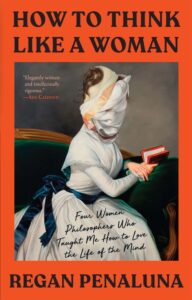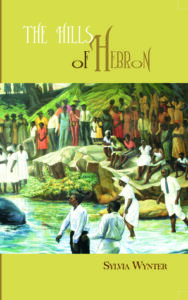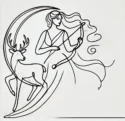The Best Books of 2024
While I intend to review all of the books I read independently within 2025, this blog did not exist in 2024. I will be going back to review books I read in the past that I think are worth giving attention to, but for now, I will simply give my favorite books of 2024. There are many other incredible books that I read, but these are the ones that stuck with me more than any others.
3. How To Think Like A Woman: Four Women Philosophers Who Taught Me How To Love The Life Of The Mind
Regan Penaluna
 As someone who entered a PhD program and quickly realized that it was not for me, the emotions that make up this book were quite familiar to me. Penaluna intersperses her own life with the lives and philosophies of four women from history. She addresses the gender gap in the field of philosophy, with women currently making up only around 20% of philosophy faculty and around 25% of graduate students. She discusses the ways the male-dominated field pushed her to the back of her classes, with the curriculum focused solely on male philosophers who often wrote of their disdain for women. Through the discovery of female philosophers, Penaluna realized that it wasn’t the field of philosophy she felt rejected from, but the way it is oriented in academia.
As someone who entered a PhD program and quickly realized that it was not for me, the emotions that make up this book were quite familiar to me. Penaluna intersperses her own life with the lives and philosophies of four women from history. She addresses the gender gap in the field of philosophy, with women currently making up only around 20% of philosophy faculty and around 25% of graduate students. She discusses the ways the male-dominated field pushed her to the back of her classes, with the curriculum focused solely on male philosophers who often wrote of their disdain for women. Through the discovery of female philosophers, Penaluna realized that it wasn’t the field of philosophy she felt rejected from, but the way it is oriented in academia.
The book weaves together the lives and ideas of four trailblazing women thinkers: Mary Astell, Damaris Cudworth Masham, Catharine Trotter Cockburn, and Mary Wollstonecraft. Penaluna examines these philosophers’ efforts to challenge societal norms and patriarchal structures of their times, offering profound insights into topics such as love, independence, and the pursuit of knowledge. Discussing her own struggles and the struggles of these women philosophers, Penaluna is inspired by their resilience and intellectual courage, to ask the larger question of what it means to think like a woman. Flipping the phrase “like a woman” on its head, Penaluna articulates it as a strength to think like a woman because she learns of all the incredible female thinkers of the past and what all they considered.
In Greek, philosophy means the love of wisdom. The field of philosophy demands subjective thinking, hyper-attention to one idea, and access to a great deal of education, but to practice philosophy, to love wisdom and adhere to it, can be done by anyone. Philosophical ideals and concepts can be created by anyone, at any time in their life, anywhere in the world. The women throughout western history who have been able to write down and articulate their philosophies do so against a culture that is against them; with this, it is clear within their writing how dedicated they are to the craft and how determined they are to speak their minds.
I have spent much of my adult life trying to understand the history of how we got where we are now as a society. The feminist position has never been a comfortable one, and though it has steadily gained more popularity, it has maintained a great deal of opposition. Reading Penaluna’s book made clear to me how much more work needs to be done. I have studied philosophy and history for eight years seriously, and longer if I include primary school but I had never heard of these women. I have always understood that history was not kind to women and that the men who wrote it made a point to not include women, often emphasizing what they saw as the faults of women to assert their own dominance. Here, I could cite Aristotle saying that women were “deformed men” or Freud saying that women develop anxiety when they realize they do not have a penis, which turns into envy. I have learned to take from philosophers what I find valuable and to leave the rest, but it is a shortcoming of the field of philosophy that it does not present more female philosophers within the central area of study rather than being specialized focuses.
The concepts that Aristotle, Freud, and the like have presented about women never made sense to me. Reading Penaluna’s story was both satisfying in her articulation that male-dominated philosophy is a choice that we can reject by focusing our attention on philosophy that is not founded on sexist ideals, and validating in her presentation of knowledge from women and for women which I can use to reformulate my own life and the way I interact in society.
On a different note, but just as important, the book has a really fun dust cover that I love having on my shelf. When I buy more shelves to actually organize my library, this will definitely be one that is on display. Regan Penaluna, thank you for your contribution to philosophy and to my own personal development as a human.
2. The Hills Of Hebron
Sylvia Wynter
 In grad school, I took a class on the philosophy of Sylvia Wynter and we ended the semester with The Hills of Hebron, Wynter’s only novel, written before her career in academia. Published in 1962, this book is an exceptional exploration of themes like identity, community, religion, and the interplay of personal and collective history in a postcolonial Caribbean context.
In grad school, I took a class on the philosophy of Sylvia Wynter and we ended the semester with The Hills of Hebron, Wynter’s only novel, written before her career in academia. Published in 1962, this book is an exceptional exploration of themes like identity, community, religion, and the interplay of personal and collective history in a postcolonial Caribbean context.
Set in the fictional rural village of Hebron, the story revolves around the religious community called the New Believers, led by the prophet Moses. Through its vivid portrayal of the villagers’ lives, the novel delves into their struggles with faith, love, betrayal, and the search for meaning in the aftermath of slavery and colonialism. The narrative is deeply human, examining how personal desires and collective beliefs clash and intertwine. Wynter employs a multi-voices narrative style, interweaving past and present, as well as spiritual and secular dimensions, to create a tapestry of voices that reflect the diversity and dynamism of Jamaican culture. Her prose is poetic and incisive, exploring not only the characters’ inner lives but also the broader social and historical forces that shape them.
Prophet Moses was considered a madman for a long time until he developed enough of a following that they were able to create a self-sufficient society in which all people felt empowered. At least for a little while. Moses has ended his life by a chosen crucifixion on the cross at the beginning of the story. Moses’ reasoning for this takes up most of the story, as well as the repercussions of his actions and how Hebron will survive after he is gone. The complication of the prophet Moses himself was one of my favorite elements of the book; it is clear to me Wynter understood that people are not all good or all bad. More so, Wynter presents the uncomfortable notion that even though a person does something for all the wrong reasons, good can still come of it–nether because of nor despite them. It is simply that when many people are involved, the outcome will change, and if one good person can find a way to inspire others to do good, everything can change.
Wynter’s academic work has been receiving more attention, with her essay “Unsettling the Coloniality of Being/Power/Truth/Freedom: Toward the Human, After Man, Its Overrepresentation–An Argument,” published in 2003 in the journal CR: The New Centennial Review being widely considered her magnum opus. Her work is singularly important in the field of critical theory, postcolonial studies and Black studies, but it is also incredibly dense. Hers is some of the most difficult philosophy and writing I have ever studied. I would encourage anyone with the desire, to read any of her writing that they can get their hands on, but I also encourage patience and reflection in the reading. Sometimes it took me a couple of read-throughs to understand what she was saying, and then a few more to understand what it all meant. Wynter has been gaining recognition, but her writing is still on the fringes of the field because of the subjects she discusses; personally, I believe that it is worth reconsidering where she is placed in the philosophical study.
By concluding the semester with The Hills of Hebron, I was able to see all of the elements that would later define her academic career foreshadowed in the novel. It is an exceptional, layered story that I will surely read again. For those who have no desire to read academic jargon (and I don’t blame you), Wynter’s novel is the perfect way to understand her philosophy. Most importantly, it is a great story. You do not have to have an interest in philosophy to read this. There is a lot going on behind the story, but the story itself is quite enjoyable. The characters are complicated, often unlikeable, but deeply interesting. Wynter creates people and lets them interact in ways that feel so organic that the omnipotent perspective of the reader can become uncomfortable at times (in the best ways). We are given access to the characters’ thought processes and the reasoning as to why they do what they do.
It deserves far more attention that it has received, and I desperately hope it gains more popularity in time.
1. Agamemnon
Aeschylus
 I should start by clarifying that this is a play, and it is the first in a trilogy. Also, it’s about 2,500 years old. It was written in the 5th century BCE and it is the only complete surviving trilogy that we have of the Greek Tragedies. As a little more backstory (and a fun fact), Greek Tragedies would be performed at Dionysian festivals as a combination of three plays and one satire play. We know that the trilogy that the Agamemnon play was a part of, the Oresteia, won first place for the dramatic competition in the Athenian festival. I say this to show that Agamemnon is part of a larger story.
I should start by clarifying that this is a play, and it is the first in a trilogy. Also, it’s about 2,500 years old. It was written in the 5th century BCE and it is the only complete surviving trilogy that we have of the Greek Tragedies. As a little more backstory (and a fun fact), Greek Tragedies would be performed at Dionysian festivals as a combination of three plays and one satire play. We know that the trilogy that the Agamemnon play was a part of, the Oresteia, won first place for the dramatic competition in the Athenian festival. I say this to show that Agamemnon is part of a larger story.
King Agamemnon, general to all the Greek armies, returns home to Argos after the Trojan War where he had led the pursuit to retrieve Helen, his brother Menelaus’s wife, who was taken by the Trojan prince, Paris. It is contested whether Helen left of her volition or was kidnapped; I am of the opinion that she was taken, but there are valid arguments to both sides and it’s not necessarily important for the story here. Agamemnon, returning home, is unaware that his wife, Clytemnestra, is planning his death.
Before the war began, while the Greeks were traveling to Troy by boat, they were met with horrible seas which almost killed them. It was concluded by the seer Calchus that the goddess Artemis (*wink, wink*) was mad at Agamemnon and he needed to offer her a sacrifice to appease her. This sacrifice would be his daughter Iphigenia. Agamemnon tricked her into coming to where the army was camped by telling her that she would marrying the famed warrior, Achilles. As we know, the sacrifice worked, the army went to Troy, and ten years later saw the complete destruction of the city. Clytemnestra, however, never forgave Agamemnon for what he did, putting the needs of the state above that of his family, allowing his family to be destroyed for the perpetuation and greatness of the Greek armies.
Clytemnestra asserts that she is seeking justice for her daughter by killing Iphigenia’s killer. Today we would look at this and understand her reasoning, calling her a brave woman, one we should admire, but it is more complicated than that. We find out that Clytemnestra ruled Argos in Agamemnon’s absence and did so as a tyrant. The people of Argos were thrilled at Agamemnon’s return because it meant the end of Clytemnestra’s reign. She also had an affair in Agamemnon’s absence with his cousin Aegisthus, who also hated Agamemnon.
Agamemnon’s father Atrus, after his brother Thyestes seduced Atreus’s wife, got revenge by tricking Thyestes into believing he wanted to make amends, killing Thyestes’s children and feeding them to Thyestes. Think Kronos. There is much more that is involved in this story, but what is most important now is that this brutal act by Atreus is the reason Aegisthus, son of Thyestes, hates Agamemnon and plots with Clytemnestra for his death.
Agamemnon also, when returning to Argos, does so with a Trojan slave, the prophetess Cassandra. Clytemnestra sees this as another act of betrayal by Agamemnon, as he tells her to cater to Cassandra and what she may need. Immediately upon his entrance, Agamemnon diminishes Clytemnestra who spent the last ten years ruling the country. Clytemnestra is an incredibly interesting figure within the Greek tragic tradition, and though the story is thousands of years old, it continues to offer new and fascinating insights into our own lives. Any reader to quickly decide whether she is good or bad, whether what she did was right or wrong, justified or not, is severely constricting all that the story has to offer. She cannot so strictly be boxed into a category, which is what I love about the play.
The second play in the trilogy is the story of Clytemnestra and Agamemnon’s son, Orestes, returning to Argos, seeking revenge for his father against his mother. The third and final play is a trial in Athens between the Furies, defending Clytemnestra as the ancient, cosmic form of justice, and Apollo, defending Orestes and the creation of a new rationale set to define Athenian life. Athens is the birthplace of democracy, and the court case replicated any court case you would see in America today, with two sides and a jury determining who they believe. Most interestingly, the jury is tied between the two sides in deciding if Clytemnestra was more justified or Orestes, and it is Athena who must break the tie.
The trilogy is a representation of the transition from blood feuds and social organization to the adherence to law within democracy. More than that, it articulates the cyclical nature of violence that perpetuates suffering, suggesting that it takes more than the person themselves to break free from it. Vengeance and justice behave as two opposing and competing forces; if truth and fairness make of the scales of justice, vengeance and justice make up the scales of the cosmos.

